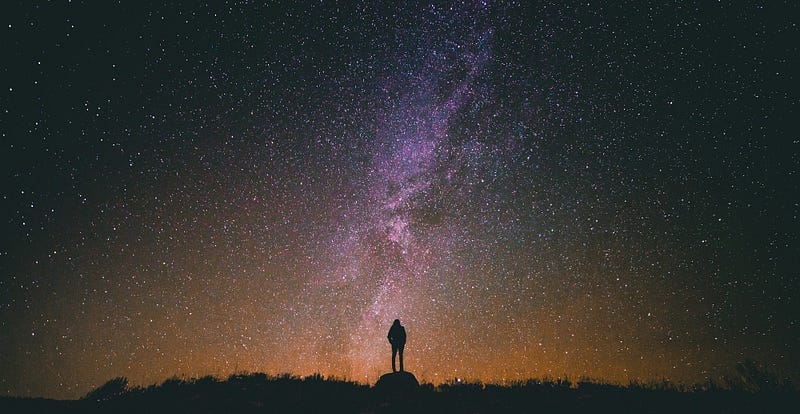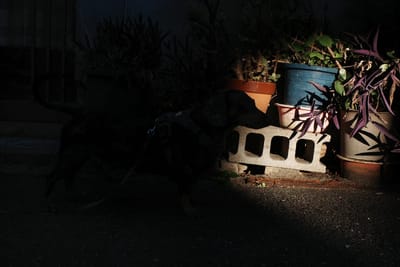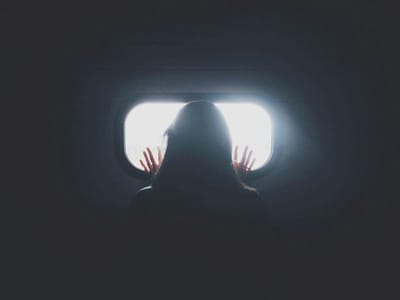What is the Individual Star?

I first came to know this term in the online course (Strengthening Our Consciousness) I took a couple of years ago at the Jungian Foundation, New York. In that moment, I knew I’d found the perfect word to beautifully portray what I know as the Source, the Soul, or the Higher Self (among other names depending on the context. They are used to describe the spirit of our individual entity that has been with us since the beginning of our, each individual, time. By the way, this entity, in Thai we call ‘Kwan’, and I wonder why I’m so drawn to these two words.
In that lecture, we touched on the topic of how the ego (note: in Jungian approach uses this word ego quite interchangeably with the word consciousness or the Self as we know it) arises slowly out of the unconscious in the course of our lives, similar to what we see in the psychological development of a child. He gave the example of a woman who has a big problem that a man wouldn’t commit to her, and it has become her pattern of driving herself into the same situations by seemingly choosing only the men who won’t commit.
It got me thinking of the essay from Schopenhauer about a similar observation on our lives as a story that seems to have a plot planned out quite systematically and gradually reveals itself from the experiences in the course of a man’s own life.
But who plotted that?
Why do we tend to find ourselves in situations that repeat themselves in patterns? Why do we choose to make the same decisions that will land us in the same predicaments or achievements without really knowing why? — This of course, you will not know why until you have some inner work to elevate your consciousness to reach that level of self-awareness and clarity. This has been the primary focus of my inner work my entire life, searching to find a way to see things more clearly and as it is, but this is for another time.
Back to the question of what makes us different and unique.
Have you ever observed what makes the two people who share many similarities; family and environmental background, what they do or have done, how they look, their financial status and success, yet somehow they end up in totally different places? Or how is someone who was born and raised out of a total ditch but managed to survive and excel exponentially at everything they do in life?
Yet, at the same time, there are some very wealthy people who arrived into the world with silver spoons jammed in their mouths but somehow end up achieving nothing, turning into a neurotic, an addict, homeless, or deciding to give up and take their own lives despite all the fortunate places they are in, or have been when they arrived into the world?
Essentially, my central question to this is: “What kind of experience, attitude, or psychological complexes, or what is it that brought all of us on the unique different journeys in our lives?
To unpack it further, “How did we develop that?”, or maybe, “What did the two people do differently that they end up totally in different places?”
This is so tricky.
No one will ever know for sure what happened, whether inside or outside the person’s control. No one knows for sure, even the person herself. I wouldn’t know what has to happen, or what things need to unfold differently, in order to alter the course of my life — because it’s not just about things that are under my control.
This balance of personality was studied extensively in Jung's works. He explained the formation of personality and what constitutes our uniqueness in a diagram of three circles that intersect and form the part in the middle that is supposed to be our unique, individual Self.
One circle is heredity, which plays an enormous role in influencing who we are from the beginning. This is something we can never really escape, exploring how much heredity plays a role in our lives, as it is something that is passed down by our biological parents, both physically and mentally. The blue eyes, blond hair, long legs, good brain, a nice set of teeth, or mental aspects like our characters, temperaments, mental disorders, or things like a tendency to develop Alzheimer's, among other things. Jung was very interested in the heredity aspect of complexes, how a complex could be passed from generation to generation, and how it could contribute to the differences in a person's personality development.
Many cultures, including Thai, have an idea similar to ‘blood is thicker than water’, or ‘it (refers to some personalities or temperaments, preferences, even pet peeves) runs in the family’, or ‘it’s in the blood’ or ‘it’s in the genes’. We believe these kinds of things can be passed on in our genes and bloodline regardless of how we were raised. In my culture, there is a strong belief, even taboo, about adopting a baby that was born with, for example, a father who is a convicted criminal or drug addict. This is because people believe that no matter how well you raise the child, he will have that criminal source in his blood, and one day he might turn out to be just like his father. True, there are cases like this, but also cases of the total opposite, so — what determines these differences? Can we blame the flaws on our parents? Which will lead us to the second circle, the environment.
There is a vast span of studies that we can spend a long time looking into but won’t be able to pinpoint any significant fact that influences our faiths. The environment covers anything from what kind of family or caretaker you had to how did they raise you. What schools and who were the friends and foes? The culture, the neighborhood, and any event that happened like the dog that bit you in sixth grade. This list goes on perpetually until the end of time. And then what came with those experiences, what scars or impressions did these events leave you?
But how about identical twins??
The two people that came out in pretty much identical packages, were made by the same manufacturer, and developed in the same environment (at the beginning of life, of course, but also there are subtle differences or even major about how the parents raised them but for now just say they were given the same exact care). Don’t they have those circles pretty similar, at least up until after the first 7 years of life when the ego is consciously formed? So they should, more or less, have the same faith?
Hence there comes the third circle. The best part.
The airy-fairy, elusive sense of intuition that is in the metaphysical part of our Self. There are many names for this that you might have heard; the Source, the Soul, the Higher Self, the Tao, even the God. The other part of our entity, the inner Self…
But what? There are two Me-s? And then things start to get a little cuckoo you think.
To me, there are two ways to experience this, and one is spirituality. I use the word experience because this is only to be realized or seen only by our individual physical and metaphysical senses. Knows only to one individual self only through self-examination can you understand. No one can do your practice and bring you this understanding, there’s only you. Meditation will strengthen and elevate your consciousness to that level of awareness, which I write about it under this topic here
In Jung’s theory, which is closely related to spirituality in my view, he associated his understanding of this to the teaching of Paracelsus; a German-Swiss physician, and alchemist who established the role of chemistry and medicine in the 16th century. Paracelsus believed that to truly understand human anatomy one must discover what constitutes and nourishes each part of the body, therefore, one must know the influence of the stars including those containing mercury, sulfur, iron, and copper sulfate atoms which are parts of the elements that make up our human bodies. Astrology was also found in the study of the Alchemy.
For this reason, during the last thirty years of his life, Jung turned to alchemy as a fundamental resource to provide a window to the confrontation with the human collective unconscious — a source of energy and insight buried in the depth of the human psyche. He believed that Astrology is one of the archetypal remnants of an ancient culture that has operated in our mind from the earliest periods of which we have records and is still with us today.
It is evident that astronomy was a prominent concept in ancient literature that indicates a link between stars and the beginnings of writing and mathematics. In a similar way, the Egyptian belief in the concept of the soul and the journey to the afterlife connects to astrology which is reflected in some connection to the appearance of a special star in the southern sky. Astrology and psychic readings in many cultures are all coincidentally referring to the constellations and the stars…
Let’s get back to earth for now.
This third circle is discussed in his Alchemical Philosophy work and called The Star in Man. Jung believed that there’s this special star that each person brings into the world that is theirs alone. Not a tribute to heredity or environment, it is something that’s only accountable for the individual nature of a person, which is their individual star.
I will write about why this third circle is such an important part to form our total psyche and the many reasons why this has been the center of my fascination with life, who we are, and why we are here. The connection in the realm of our human mind and its celestial metaphysical dimension, the collective unconscious that has been with all of us regardless of race, culture, or heredity, since the breaking dawn of our civilization. The energy, the consciousness, the soul, the star — all of it.
Isn’t life fascinating?
Thank you for spending time with me today.





